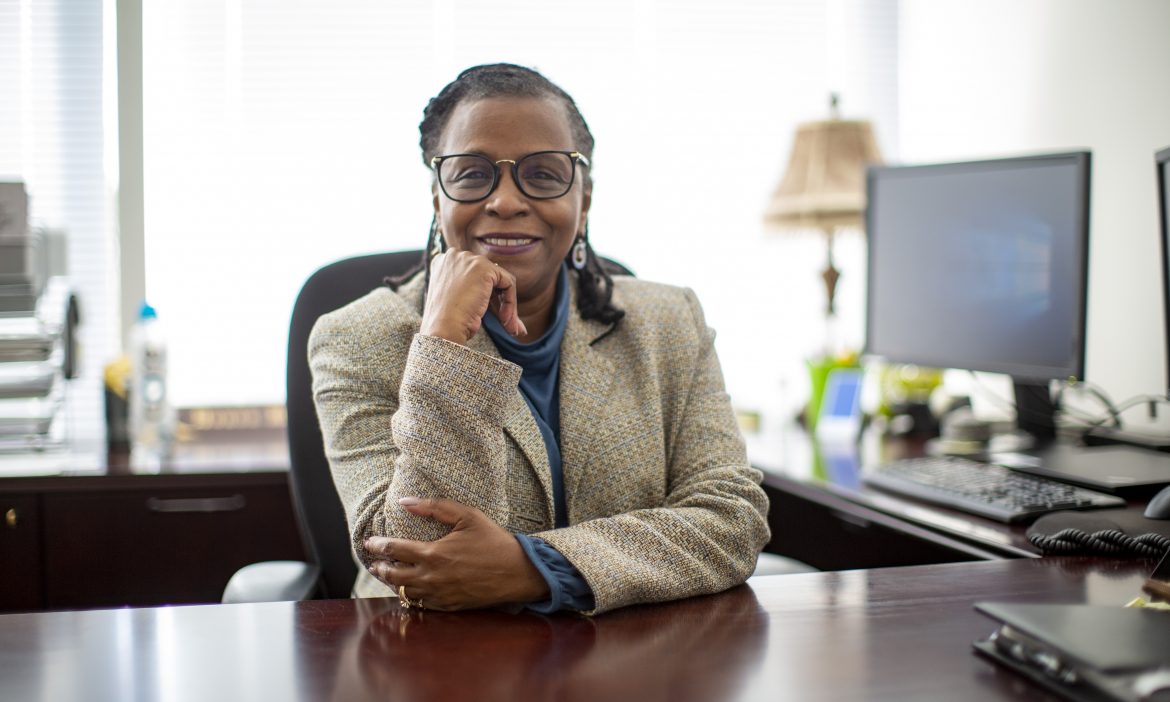When you’re a young single mother and college student, every day can be a struggle. Vonda Harrison, Ph.D., vividly recalls those days.
“I knew that I wanted something better,” she recalls. “One day I said, ‘I don’t want to struggle like this.’ So that day I went down to the Air Force recruiting station.”
That decision altered the course of her life and career. Dr. Harrison was no stranger to the military, as her father served in the Army.
She was also prepared for his tough-love feedback.
“I remember my dad kind of laughing and telling me, ‘You’re petite, you’re not strong, you’re not physically fit. Certainly, you’re not going in,’” Dr. Harrison says.
She set out to prove that she was capable of not only going in, but excelling and building a career and better life for herself and her daughter.
What followed was 23 years as an active enlisted officer, during which she earned a bachelor’s degree and two master’s degrees. She was well on her way to earning a Ph.D. before retiring with the rank of master sergeant in 2003.

A unique introduction to health care
Dr. Harrison entered the Air Force as an enlisted airman and had the opportunity to train in areas related to health care.
“I started out as a dental assistant, then trained to become a hygienist,” she says. “After about six years, I transitioned to the operations side of health care, focusing on patient safety and quality improvement.”
As she was promoted, she attended various leadership academies, one of which was focused on former Secretary of State and retired Gen. Colin Powell’s leadership principles, and even accepted an assignment as special instructor for a professional military leadership program in Italy for five years.
Her interest in behavioral health came about almost by accident.
“The majority of my military career was spent in health care operations,” Dr. Harrison says. “But as the senior non-commissioned officer having oversight of the mental health services, I became close with a psychiatrist in a Florida hospital. As we worked together, I saw a lot of post-traumatic stress disorder [PTSD]. That was my first encounter with behavioral health, and I’ve never been able to leave behavioral health since.”
As Dr. Harrison prepared to retire, her many encounters with PTSD sufferers stuck with her. She was especially concerned for veterans who had been deployed, served their country with distinction and were now homeless because they were not getting the services they needed.
“I have a deep love for people and enjoy helping them through their struggles,” she says. “I saw that PTSD was an epidemic, but many veterans were going undiagnosed and committing suicide due to the stigma, embarrassment and feeling of hopelessness. My interest only grew from there.”
A new kind of service
Before embarking on the next phase of her career, Dr. Harrison had to prepare herself for the transition into the civilian world. She knew it could be challenging.
“There were so many people who, after serving 20 years or more, were jobless and homeless,” she says. “You have to remember, in the military, you have shelter, you have food, you have clothing, you have an income, but you don’t have a lot of choices. You’re serving your country and being deployed, told where to go and what to do. To go through all of that and emerge with a skill set that does not convert very well to the civilian sector, or in many cases not have any degree to fall back on … it was night and day.”
Ironically, earning one of her master’s degrees helped Dr. Harrison prepare for that transition.
“Because I never had a job outside of the military, I didn’t know how to interview,” she says. “But because the military paid 100% of my education, I received a master’s in human resources, which actually taught me how to interview and write resumes, but also gave me another area of knowledge.”

That resume-writing skill came in handy when she went to work for an Atlanta-area hospital, her first job outside of the military. In 2011, she began working for a behavioral health services company that partnered with BlueCross. That experience provided a stepping stone for joining BlueCross in 2015 when all behavioral health services were brought in house.
In her current role as manager of behavioral health quality, she helps ensure BlueCross is equipped to provide the best behavioral health expertise and resources.
“Many of our members rely on these services, and my role is to oversee the quality while also complying with accreditation standards and state regulations that impact our members,” she says. “These standards and regulations are in place for a reason — to help us better care for the communities we serve.”
“For example, a standard might require we analyze our members’ experiences with their health plan,” Dr. Harrison continues. “We then develop a process to gauge that member experience, such as a survey. That method allows us to not only adhere to the standard, but also to collect valuable feedback from our members and help us better serve them.”
“My job is to ensure our members are benefitting from the highest quality of service based on our commitment to meeting those standards and maintaining our accreditation.”
Given her background in the military and experience not only in quality management but helping those with behavioral health disorders, Dr. Harrison finds her current role a rewarding one.
“In the military, there is a high culture of core values and integrity,” she says. “To come into a large company where you immediately see evidence of that same culture makes you want to stay. At BlueCross, you can see the deliberate focus on the member, and making sure that the member has everything they need. Being part of providing that help makes me want to stay.”

That deliberate member focus is just one reason Dr. Harrison has grown her career at BlueCross. We also work hard to maintain an inclusive company culture where every employee feels welcome and valued, including veterans who bring unique perspectives – and have distinct needs. Dr. Harrison has benefitted from that support, and is quick to recognize how it has benefitted other veterans, as well.
“BlueCross makes a conscious effort to hire vets, and that speaks volumes,” she says.An always-open mind
Dr. Harrison is a voracious reader and occasionally teaches graduate courses online. She also enjoys traveling with her husband, Ray — also an Air Force veteran and licensed mental health professional — and spending time with their three daughters and six grandchildren. The couple met while both were in the service.
What motivates Dr. Harrison now is the same drive that carried her through 23 years of military — opportunities to learn and lead.
“Throughout my career, I’ve been supported by people who saw things in me that maybe I didn’t see in myself,” she says. “Because I had people to influence me, they made me want to learn and do more — whether it was risk management, quality management, health insurance or behavioral health — and be in roles where I could influence others.”
“As much research as I’ve done and as many leadership roles as I’ve been in, you can always learn something new. I’m still learning, always learning!”


 Jesse joined the BlueCross BlueShield of Tennessee corporate communications team in 2017. A Chattanooga native, he has more than 15 years’ experience in content creation, management, and strategy for consumer audiences, including a six-year stint in health care marketing.
Jesse joined the BlueCross BlueShield of Tennessee corporate communications team in 2017. A Chattanooga native, he has more than 15 years’ experience in content creation, management, and strategy for consumer audiences, including a six-year stint in health care marketing.